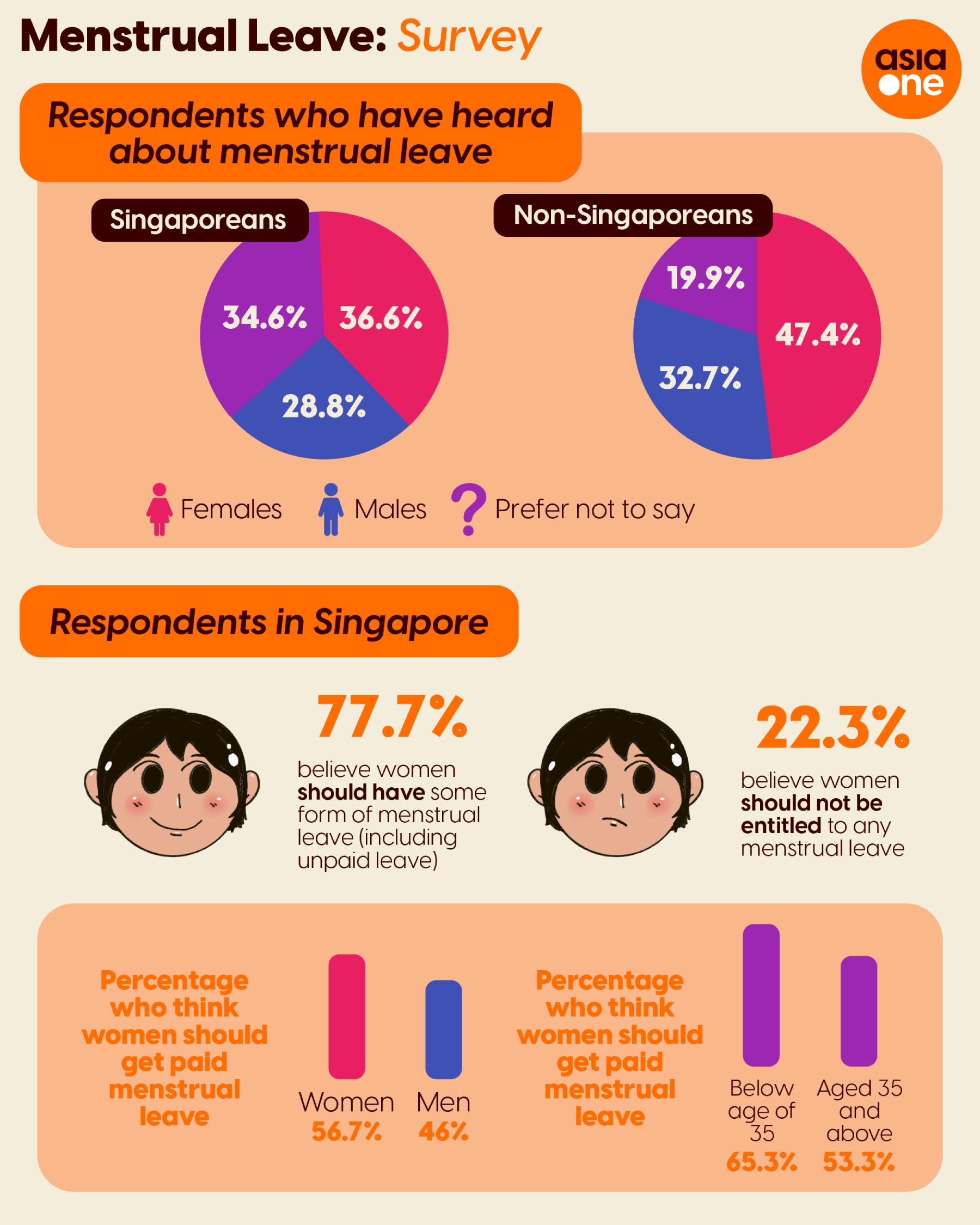'We don't want to appear weak': Only 56.7% of Singapore-based women support the idea of menstrual leave
 JULY 12, 2022PUBLISHED AT 8:27 PMByCANDICE CAI
JULY 12, 2022PUBLISHED AT 8:27 PMByCANDICE CAI
Pexels
On days when medication and heat packs do little to ease her period cramps, 25-year-old Tan Jiaqi* resorts to taking urgent leave to rest at home.
"I'll personally only take half a day's leave if it gets too bad," shared Tan, stating that on some months "if I'm able to tahan (endure), then I won't take".
.
As for Nicole Cheah, 32, who suffers from premenstrual dysphoric disorder (PMDD), her PMS symptoms include cramps, migraines, intense mood swings, insomnia and brain fog.
"It always affects my work, to the point where I might as well not be working," said the senior manager at Rainbow Centre.
"I'm especially irritable and it also affects the way I relate to and interact with colleagues," shared Cheah.
So far, women like Jiaqi and Nicole have mostly had to suffer in silence when it comes to dealing with painful period cramps every month.
They both told AsiaOne that having paid menstrual leave would be welcome, especially when such provisions are rarely seen in Singapore.
"Being able to take a day off to rest and get through the symptoms, guilt-free, would be helpful to me and probably the people around me," shared Nicole.
More than four in 10 people surveyed in Singapore have admitted to taking time off work regularly to deal with period pains, according to a study by period-care brand, Blood.
In a 2021 survey conducted by sex toy company Womanizer, 52 per cent of 470 female respondents from 26 countries believed that it isn't socially accepted to take sick leave for period cramps while 47 per cent fear that their employers will not accept period pain as a valid reason for sick leave.
The result is probably one which resonates with Nicole.
"It feels weird to take urgent annual leave (AL) for period issues, and AL is so precious I don't even think of applying for it," shared Nicole.
She also cited going to the doctor to take MC as "too much effort", adding that she'd only take medical leave when symptoms get "really bad", which she recalled has happened only thrice so far.
But could that soon change?
On May 17 this year, the Spanish government approved a draft bill which aims to grant paid medical leave for women who suffer from severe period pain — a first in Europe.
Around the world, some companies have begun to adjust their workforce policies to allow women time off during their time of the month.
India-based food delivery company Zomato was applauded by social media users and women's rights groups in 2020 when they announced that they were allowing women and transgender employees up to 10 days of period leave a year.
"There shouldn't be any shame or stigma attached to applying for a period leave," Zomato chief executive Deepinder Goyal said in a note to staff.
However, it also triggered intense debate in a nation where menstruation is still considered taboo, Al Jazeera reported.
So what do Singaporeans think about menstrual leave and whether it should be implemented?
According to an informal poll that AsiaOne conducted in June, 77.7 per cent of the 570 Singapore residents surveyed think women should have some form of menstrual leave (including unpaid leave), and slightly more than half (51.1 per cent) believe that women should be entitled to paid menstrual leave.
Conversely, 22.3 per cent of respondents said that women should not have period leave at all.
Unsurprisingly, younger people, specifically those aged below 35, were more likely to think that women should receive up to 12 days of paid menstrual leave, with a total of 50 per cent of them in agreement.
When it comes to the opinions of men, they may not be as unsupportive as we think.
Close to half (46 per cent) of men would support having paid menstrual leave — compared to the 56.7 per cent of women who support the idea.
Surprisingly, however, not all women support the idea of menstrual leave.
Forty-three point three per cent disagreed with the idea, with 4.5 per cent stating that menstrual leave should be unpaid.

To Nicole, having paid menstrual leave would be a significant move in "understanding, accepting and normalising women's reproductive issues and conditions".
"These conditions are real and felt, and have a huge impact on how women live out most of their lives," she added.
Nicole expressed how despite painful and sometimes debilitating menstrual symptoms, many women just "suck it up and carry on".
The reasons, she believes, are manifold.
"We don't want to appear weak, there is a stigma attached and we can't quantify what typical symptoms are and the level at which we should be experiencing them," said Nicole, citing a lack of education and understanding in society.
And even if menstrual leave is implemented, it doesn't mean the stigma goes away.
"Perceptions and accusations from peers that I am abusing the system", "a fear that I won't be believed" as well as being compared and perceived to be "weaker" or "less resilient" as compared to female peers who don't have to utilise period leave are issues that Nicole foresees grappling with.
However, Nicole acknowledged that much of it might actually be an "internal struggle", as she believes her current employer would be understanding about any time off taken to deal with menstrual pain.
It is a common refrain heard from several women, when we asked them if they would have hesitations about utilising period leave. Fear of being judged, and whether it would hinder in the appraisal process were some of the reasons given.
And it's not just women who hold this view. Some of the concerns expressed by men who support period leave was whether work efficiency would be affected and whether such benefits would be abused.
Randy Tan, 46, a senior manager in the logistics industry who supports the idea of paid menstrual leave, shared: "Men might not be as sensitive [to period issues] and even be biased against it, especially if they are single."
*not her real name
[email protected]






